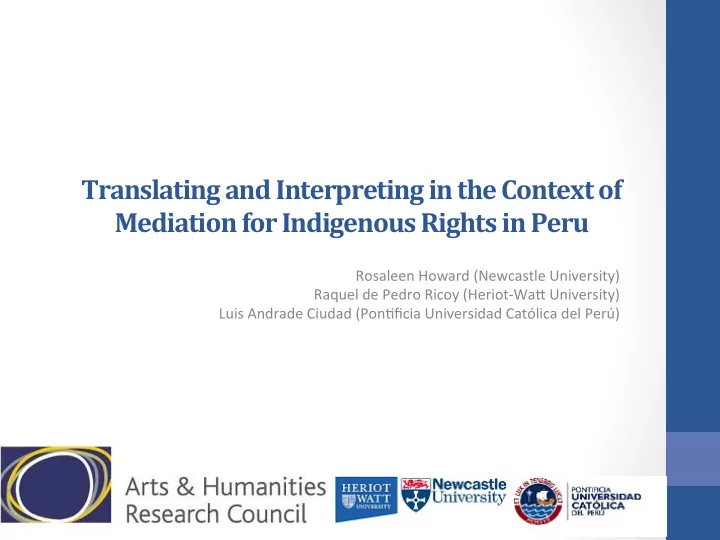

Translating and Interpreting in the Context of Mediation for Indigenous Rights in Peru Rosaleen Howard (Newcastle University) Raquel de Pedro Ricoy (Heriot-Wa; University) Luis Andrade Ciudad (Pon?ficia Universidad Católica del Perú)
1st International Forum on Social Activism in Translation and Interpreting, held in Granada from 28th to 30th April 2007, Declaration: We (…) call upon translators, interpreters, researchers and students of Transla7on and Interpre7ng who are aware of the need for a change of direc7on in these professions to put their knowledge at the service of society as a whole, and of all socie7es, with the aim of: • building intercultural socie7es which, without adversely affec7ng the host cultures, favour communica7on and mutual enrichment among the different cultures present in each society; • reinforcing links between social movements around the world that work to promote a more just society; • defending language diversity through making transla7ons available and showing respect for the equal dignity of every language in all spheres, including academic circles, faced with the hegemonic dominance of colonial languages; (…)
Aims of the project • To iden7fy and cri7cally analyse the issues related to transla7on and interpre7ng which arise during the implementa7on of indigenous rights legisla7on among the Andean and Amazonian peoples of Peru. • To focus on the challenges faced by indigenous translators and interpreters when prac7sing in contexts where the oJen tense rela7ons between the State and the indigenous peoples of Peru are brought to the fore.
Ethnolinguistic map of Peru 47 languages, 16 language families Highlands : Quechua, Aymara, Jaqaru Amazonia : Ashaninka, Shipibo, Awajún, Matsigenka and many more
Mining concessions in the highlands
Oil extraction concessions in Amazonia
Context: confrontation between Awajún people and the State at Bagua, N. Peru, 2009
Language rights and Peruvian legislation • 1993: State Cons*tu*on. Art. 48 guarantees speakers of indigenous languages the right to an interpreter • 2003: Ley de Lenguas (28106). Indigenous Languages Act • 2007: Decreto de Ley de Lenguas . Execu7ve Order on Languages • 2011: Ley de Lenguas (29735). Indigenous Languages Act • 2011: Ley del Derecho a la Consulta Previa (29785). Right to Prior Consulta7on Act
Ley de Lenguas/Languages Act • Regulates the use, preserva7on, development, revitalisa7on, promo7on and diffusion of the indigenous languages of Peru. • Art. 4 states that the en7tlement to the services of a “translator” for communica7on purposes between indigenous people and the public sector is a human right.
Law on the Right to Prior Consultation • Aims to reach an agreement or consent between the State and the indigenous or originary peoples [...] by means of an intercultural dialogue which guarantees their inclusion in the decision making processes of the State and the adop7on of measures which respect their collec7ve rights (Art. 3). • Art. 16 guarantees the right to an interpreter in prior consulta7on processes, who must be trained in the specific subject ma`er and registered by the governmental body specialised in indigenous affairs.
Institutional response • The Directorate for Indigenous Languages ( Dirección de Lenguas Indígenas ), which is part of the Ministry of Culture, set up a training programme to qualify translators and interpreters ( Curso Básico ) in 2012. • There have been eight edi7ons of the Curso . 253 translators/ interpreters have been qualified and 14 languages have been covered. • Ini7al emphasis on Prior Consulta7on processes. Subsequently, PSIT also covered.
Training of translators/ interpreters • Three-week intensive programme ( Curso Básico ), which leads to membership of the official register • Specialised workshops (e.g. health, jus?ce) • Training workshops for those working in Prior Consulta?on processes, jointly facilitated by the Ministry of Culture and the Ministry of Energy and Mines • Placements
Positive outcomes • The figure of the indigenous translator/interpreter has gained visibility and, for the first ?me, has been officially recognised by the State. • Indigenous peoples who had not been previously in contact have been able to network and develop links. • A Na?onal Associa?on of indigenous translators and interpreters (ANTRAIN-PERU) has been created. • The transla?on of legal and paralegal texts has increased the wri;en corpus in some of the indigenous languages. • Linguis?c human rights have been promoted. Translators and interpreters are seen, and see themselves, as guarantors of the visibility and revitalisa?on of their languages.
Challenges • Training provision: • Length of the Curso • Different backgrounds, educa?onal levels and experience of the par?cipants • Non-language specific • Professional prac?ce • Public and ins?tu?onal percep?ons • Percep?ons of the users of interpre?ng services • Neutrality vs. allegiance • Co-presence of interpreters qualified by the Directorate of Indigenous Languages and untrained, local interpreters in Prior Consulta?on processes • Lack of agreement as to transcrip?ons systems (alphabets) for indigenous languages • Difficul?es of transla?ng technical and legal terminology into languages that have no equivalents • Asymmetry of discursive and text-generic pa;erns between Spanish and the indigenous languages • Language hegemony: Spanish as a lingua franca
Conclusion • The language situa?on in Peru, a post-colonial State, has been, historically, characterised for the viola?on of linguis?c human rights. It remains complex and asymmetrical. • If it is to succeed, the training ini?a?ve has to be embedded in, and backed by, wider policies in support of indigenous rights. • The State and civil society have to take responsibility in the defence and promo?on of linguis?c human rights, which cannot be merely “devolved” to the indigenous translators and interpreters. • The interac?on of translators and interpreters with public ins?tu?ons needs to be strengthened, so that not only the scope of their role, but also its limits and complexity are properly understood.
Recommend
More recommend